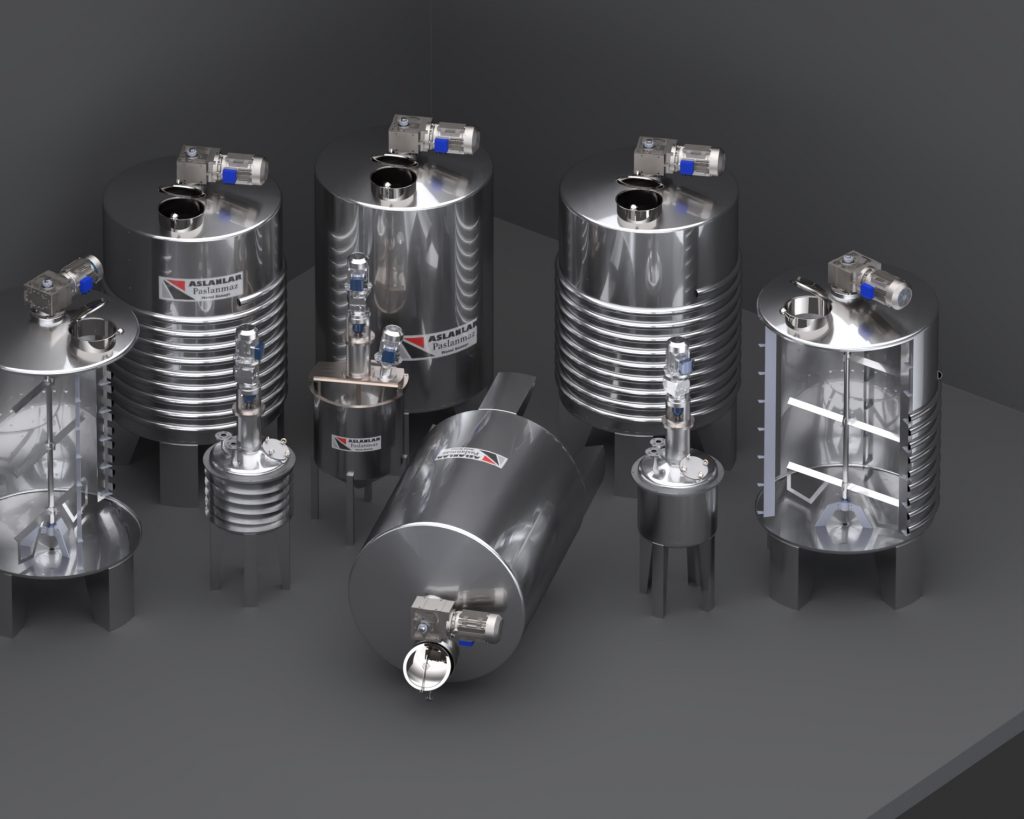Stainless steel mixers are an integral part of industrial production processes. They play a critical role in a wide range of applications, such as optimizing chemical reactions, homogenizing food products, and ensuring sterile processes in pharmaceutical manufacturing. In this article, we will examine in detail the role of stainless steel mixers in production, their advantages, and their areas of application.
2. Properties of Stainless Steel
Stainless steel is one of the most preferred materials for industrial equipment. The reasons for this can be listed as follows:
- Corrosion Resistance: Stainless steel is resistant to rust even in humid and acidic environments.
- Hygienic Structure: In the food and pharmaceutical industries, it provides an easy-to-clean and healthy surface.
- Long Life: Thanks to its high durability, it can be used reliably for many years.
- Aesthetic Appearance: Its smooth surface and shiny structure offer both functional and visual advantages.
These features make stainless steel mixers indispensable in many industries.
3. History of Mixer Technology
Mixer technology has undergone a great evolution since the industrial revolution. While the first mechanical mixers consisted of simple mechanisms, today’s IoT-supported automation systems have made production processes more efficient.
Throughout history, mixers have gone through the following stages:
- Manual Mixers: Used in simple and small-scale production processes.
- Mechanical Systems: Integrated into industrial production with steam-powered systems.
- Automation-Assisted Systems: High-precision mixers used in modern production processes.
4. Types of Stainless Steel Mixers
Stainless steel mixers are produced in different designs according to their intended use. Here are the most common types:
Horizontal Mixers
Ideal for mixing dry and dense materials. For example, they are used for the homogeneous mixing of flour and powdered chemicals.
Vertical Mixers
Preferred for liquid-based mixtures. They provide effective results in mixing substances such as milk, liquid oil, or chemical solutions.
High-Speed Mixers
Used in production processes that require fine homogeneity and rapid reactions. They are very common in the cosmetics and pharmaceutical industries.
Areas of Use
Stainless steel mixers have a wide range of applications in industrial production. Here are the main sectors and their applications:
Chemical Industry
Used to ensure that chemical reactions occur in a balanced manner and that components are distributed homogeneously. For example, paints and adhesives are prepared with these types of mixers.
Food Sector
It offers a hygienic solution for processing products such as sauces, beverages, and dough. Compliance with hygiene standards is of great importance in food production.
Pharmaceutical Industry
Stainless steel mixers are indispensable for drugs that must be produced under sterile conditions. It requires microscopic homogeneity and precision.
Cosmetics Industry
Ensures the homogeneous mixing of skin care products, shampoos, and creams.
6. Stainless Steel Mixers in Food Production
In food production, where hygiene is of great importance, stainless steel mixers offer the following advantages:
- Easy Cleaning: Its smooth surface prevents the accumulation of bacteria.
- Hygienic Production: The material surface prevents foreign substances from mixing with the products.
- Long-lasting Use: Provides durability even when working with acidic materials.
For example, these mixers are frequently used in the processing of sensitive products such as dairy products and fruit juices.
7. Stainless Steel Mixers in the Chemical Industry
In the chemical industry, preserving material properties and ensuring a balanced mixture is of critical importance. The main roles of stainless steel mixers in this sector are:
- Stabilizing chemical reactions.
- Combining substances with different viscosities.
- Resistance to high temperature and pressure.
For example, specially designed mixers are used in the production of detergents and fertilizers.
8. Applications in the Pharmaceutical Sector
Stainless steel mixers ensure the precise processing of active ingredients used in pharmaceutical production. The advantages of stainless steel mixers for the pharmaceutical industry are:
- Sterility: Minimizes the risk of contamination of drugs.
- Precise Mixing: Provides micron-level homogeneity.
- FDA Compliant Design: Manufactured in accordance with international health standards.
These features offer a wide range of use, from tablets to liquid medicines.
9. Economic Advantages of Stainless Steel
Although stainless steel has a high initial investment cost, it offers an economical solution in the long run. The reasons for this are:
- Low Maintenance Cost: Being corrosion-resistant, it does not require frequent replacement.
- Long Life: Its durable structure ensures years of use.
- Energy Efficiency: It reduces costs by consuming less energy.
10. Environmental Factors and Sustainability
Stainless steel is an environmentally friendly material. It is a sustainable option for the following reasons:
- Recyclability: It can be re-evaluated after its service life is completed.
- Energy Efficiency: It saves energy during production processes.
- Low Waste: Minimal waste is generated during production.
11. Things to Consider When Choosing a Stainless Steel Mixer
The following factors should be considered when choosing a stainless steel mixer:
- Intended Use: It should be suitable for the product type and production capacity.
- Material Quality: High-quality stainless steel should be preferred.
- Motor Power: There should be sufficient motor power for high performance.
Stainless steel mixers are indispensable in industrial production due to their durability, hygienic structure, and wide range of applications. Their importance in sectors such as food, pharmaceuticals, chemicals, and cosmetics is increasing day by day.


